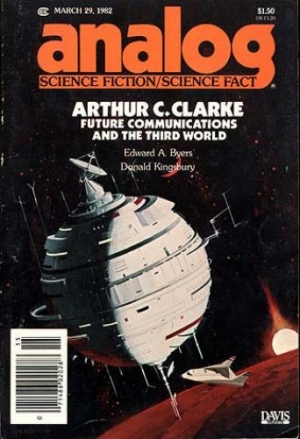Birthday Reviews: Greg Bear’s “Schrödinger’s Plague”

Greg Bear, considered one of the “Killer B’s” with Gregory Benford and David Brin, was born on August 20, 1951 and is married to Astrid, daughter of Poul and Karen Anderson.
Bear won the Nebula and Hugo Award for his novelette “Blood Music” and his short story “Tangents.” He also won the Nebula Award for the novella “Hardfought” and the novels Moving Mars and Darwin’s Radio. Moving Mars also won the Ignotus Award and Darwin’s Radio earned him his second Endeavour Award, the first was for Dinosaur Summer. He won the Prix Apollo for Blood Music and the Prix Ozone for /Slant. He won the Seiun Award for his story “Tangents” and “Heads.” In 2006, he received the Robert A. Heinlein Award and he was the Worldcon Guest of Honor for Millennium Philcon in Philadelphia in 2001.
“Schrödinger’s Plague” first appeared in the March 29, 1982 issue of Analog Science Fiction/Science Fact, edited by Stanley Schmidt. Bear included it in his short story collected Tangents in 1989 and in 1992, the story was translated into Dutch and into German in 1997. Ursula K. Le Guin and Brian Attebery included the story in The Norton Book of Science Fiction: North American Science Fiction: 1960-1990. Bear against included it in a collection with The Collected Stories of Greg Bear and when that volume was divided into three smaller books, it was invluded in Just Over the Horizon: The Collected Stories of Greg Bear Volume I.
If you ask people about Schrödinger’s cat, most will tell you that it has something to do with a cat in a box that is both alive and dead until someone looks at it. In reality, the Gedankenexperiment is much more complex and Greg Bear plays a little with that complexity in “Schrödinger’s Plague.”
In the story, a quantum physicist has created his own version of Schrödinger’s experiment, but with the entire human race at stake. The story is framed as an exchange between Werner Dietrich and Carl Kranz who have learned of the experiment and must decide how to handle the news of it. The experiment, itself, is described in a journal that details how Marty Goa called together several scientists and informed that that he may have exposed them to a highly virulent plague virus with symptoms that won’t appear for nearly ten months. Until the symptoms appear (or don’t appear) none of them could know if they were exposed or not because exposure was based on the decay of an americium atom and Marty destroyed the mechanism and the plague virus without knowing if it had been released.
Bear never fully explores Goa’s reason for conducting a potentially extinction level version of the thought experiment, leaving open the interpretation that the character is insane and can’t distinguish between a theory and reality. The other scientists come to the conclusion that any apparent symptoms from any of them after the incubation period will mean that the virus has been released, even if the symptoms are psychosomatic in nature, which seems to belie the idea that the observation of reality means anything since the virus could retroactively be released, as it were, simply by believing it had been.
Reprint reviewed in the collection The Collected Stories of Greg Bear, by Greg Bear, Tor Books, 2002.
 Steven H Silver is a sixteen-time Hugo Award nominee and was the publisher of the Hugo-nominated fanzine Argentus as well as the editor and publisher of ISFiC Press for 8 years. He has also edited books for DAW and NESFA Press. He began publishing short fiction in 2008 and his most recently published story is “Doing Business at Hodputt’s Emporium” in Galaxy’s Edge. Steven has chaired the first Midwest Construction, Windycon three times, and the SFWA Nebula Conference 6 times, as well as serving as the Event Coordinator for SFWA. He was programming chair for Chicon 2000 and Vice Chair of Chicon 7. He has been the news editor for SF Site since 2002.
Steven H Silver is a sixteen-time Hugo Award nominee and was the publisher of the Hugo-nominated fanzine Argentus as well as the editor and publisher of ISFiC Press for 8 years. He has also edited books for DAW and NESFA Press. He began publishing short fiction in 2008 and his most recently published story is “Doing Business at Hodputt’s Emporium” in Galaxy’s Edge. Steven has chaired the first Midwest Construction, Windycon three times, and the SFWA Nebula Conference 6 times, as well as serving as the Event Coordinator for SFWA. He was programming chair for Chicon 2000 and Vice Chair of Chicon 7. He has been the news editor for SF Site since 2002.
The arguably most influential author born on this date was Howard Phillips Lovecraft. Just looking back on my previous Birthday reviews, the number of Lovecraft-influenced stories I have read and reviewed would bolster that argument.
But no, Rich, I feel completely justified in selecting Greg Bear for today’s honor/
Little doubt that Lovecraft was the most influential, but I have no argument whatsoever with the choice of Greg Bear!
Though actually his fellow Greg, Egan, would certainly have been a good choice too.
The other interesting choice would have been the much more obscure but often interesting Arthur Porges.